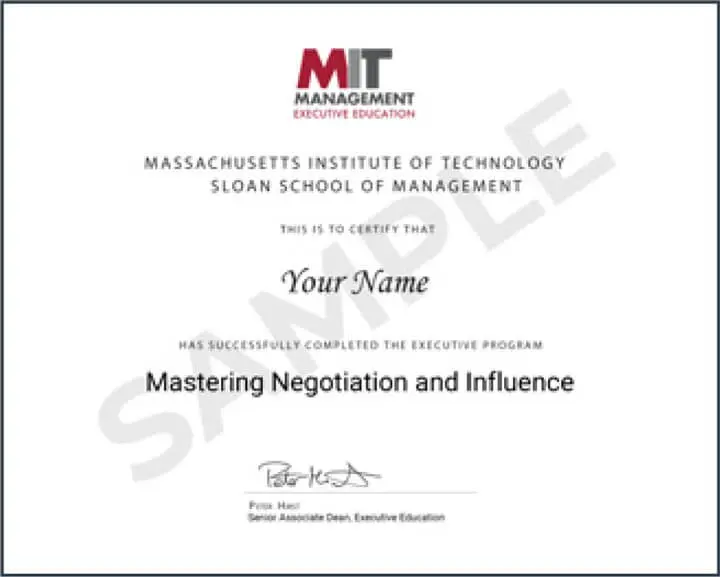Mastering Negotiation and Influence
Learn How to Influence Others to Change the World
MIT aims to produce principled, innovative leaders who improve the world. To make a difference, you must first be able to influence people. By understanding how to negotiate effectively, you can gain a competitive advantage, achieve business objectives, and effect change.
In Mastering Negotiation and Influence, you will learn negotiation strategies to understand, plan, and achieve your objectives in a variety of contexts. What separates this program from others is the fact that you will engage in real-time negotiations and receive feedback in real time. Beyond learning the frameworks and skills associated with negotiating, you will practice putting these new skills into action.
Program Experience

83 Video Lectures

12 Discussions

9 Live Negotiation Simulations

1 Negotiator's Dealbook

2 Peer Review / Discussions
Program Modules
This program includes 8-10 practice hours involving live partner simulations
Faculty

Associate Professor, Work and Organization Studies
Jared Curhan is an Associate Professor of Organization Studies at the MIT Sloan School of Management.
Curhan specializes in the psychology of negotiation and conflict resolut...
Participant Testimonials




Certificate
Receive a verified digital certificate of completion from MIT Sloan School of Management. This program also counts towards an MIT Sloan Executive Certificate.
After successful completion of the program, your verified digital certificate will be emailed to you, at no additional cost, in the name you used when registering for the program. All certificate images are for illustrative purposes only and may be subject to change at the discretion of MIT Sloan.
FAQs
Didn't find what you were looking for? Write to us at learner.success@emeritus.org or Schedule a call with one of our Program Advisors or call us at +1 401 264 8575 (US) / +44 150 730 4811 (UK) / +65 3138 5193 (SG)
Early Registrations Are Encouraged. Seats Fill Up Quickly!
Flexible payment options available.
Starts On
